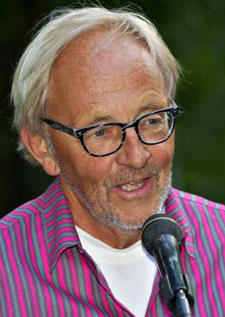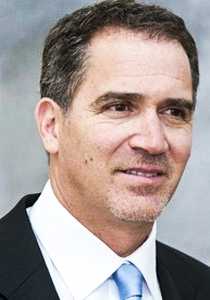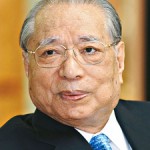Archive for March, 2015
Iran Nuclear Deal: Can One Dare Hope?
By Farhang Jahanpour
After 36 years of hostility between Iran and the West and 13 years of nuclear negotiations, first involving Iran and the European Troika (Britain, France and Germany), followed by the P5+1 (the above countries plus the United States, Russia and China), it seems that finally one can start to be optimistic and hope that a long, dark chapter will come to an end.
The next few days up to the end of March are the most crucial days in this long road, but after many ups and downs and many false hopes the end may be in sight. To be sure, nothing is certain until the final announcement has been made. Still powerful forces are hard at work to prevent the success of the talks, but there is some room for optimism. The important point to bear in mind is that talks with Iran were never only about Iran’s nuclear program.
The victory of the Islamic revolution toppled the staunchly pro-Western Mohammad Reza Shah who was acting as the gendarme of the region on behalf of the West, and replaced him with intensely anti-Western Ayatollah Khomeini who wanted to spread the Islamic revolution and replace the existing order with a religious theocracy. The revolution created the biggest upset in the history of the Middle East since the end of the First World War, the collapse of the Ottoman Empire and the Sykes-Picot division of the Middle East among various European colonial powers.
With the start of the Cold War and the rise of the American superpower, the Middle East was divided between the two blocs, with some countries such as Egypt, Syria, Iraq, Libya and Algeria leaning towards the East and other countries such as Iran, Turkey and Persian Gulf monarchies leaning towards the West. Despite occasional upsets, that situation had remained fairly stable until the victory of the Iranian revolution. Read the rest of this entry »
Nigeria’s big election questions
It has been said that “Brazil has a future and always will”. The quip cannot be made about Nigeria. It has a future and it is working towards it without the mind-boggling mistakes that have been made in recent years in Brazil.
Nigeria’s economy, the largest in Africa, has grown eleven fold since 2000, according to Goldman Sachs. Since democracy was restored in 2010 the national income has almost trebled. According to a Citigroup report published in 2010 Nigeria will have the highest GDP growth in the world between 2010 and 2050. Already its GDP per capita is 3,900 US dollars per person.
Nigeria goes to the polls on Saturday to vote in what is going to be a closely fought election. It’s probably fair to say that right now poorer voters don’t feel they are on the lift going up. Growth has not trickled down to them as much as it should, at least in terms of incomes although their access to clean water, medical help and education may have improved. Economists say they won’t get a real leg up until Nigeria approaches double digit growth. Read the rest of this entry »
Nato and Russia – a tragedy unfolding
By Gunnar Westberg
In the antique Greek tragedy the end is often predetermined by the initial conditions. The King may have committed an unforgiveable transgression and the consequences are born by him and his House.
Step follows upon step, each step decided by Fate, and the characters have little choice, given their nature and their perception of the situation. In the end Fate brings destruction upon the King and his House.
Prologue
In 1984 a group from IPPNW Sweden met with the Norwegian general Tönne Huitfeldt, at that time Chief of the Military Staff of Nato. He was a man with great confidence in himself and in the military system.
“General Huitfeldt”, we asked, “when you work with your war scenarios in the Nato Headquarters, with the destruction of the world through a nuclear war looming as a possible outcome, are you not scared?”. “Oh no, never,” he responded. “The Russians are as rational as we are. They will never let it go too far. I am never scared”. Read the rest of this entry »
Will there be a deal with Iran?
Gareth Porter, investigative reporter, author of the book, Manufactured Crisis,and new TFF Associate shares his formidable knowledge about the problems and what might happen in caase the U.S. is not willing to lift the sanctions as soon as possible after a deal has been signed.
Hitler and Stalin: Two Europeans
By Johan Galtung
Hitler was about race, Stalin about class. Their theories were based on one contradiction: Aryans vs non-Aryans for one; workers vs capitalists/landowners for the other. The ills of their countries followed from the contradictions at the top of their verbal pyramids. As Western intellectuals they tried to explain much from one axiom. Thus, to Hitler bolsheviks and plutocrats were both mainly Jewish.
Their utopias were contradiction-free, by cleansing; ethnic for Hitler, class for Stalin. Only Aryans; all others killed-expelled-marginalized by the power of the NSDAP, National-Socialist German Labor Party for one; all capitalists/landowners killed-expelled-marginalized by the power of the vanguard of the proletariat CPSU(B), the Communist Party of the Soviet Union (Bolshevik) for the other.
So similar that one may ask: did they imitate each other? Like armies becoming similar by fighting, so also the machines for reshaping societies in the European civil war 1917-1945 (plus minus some years?).
There is another, better explanation: if the theory is pyramidal, so also the practice, the policy machinery. The ultimate power should be in the hands of those licensed as ultimate truth-holders. Those lower down have to learn the smaller, specific truths and enact them.
That pattern identity, isomorphism, between theory and practice pyramids came from the same source in Germany and Russia: Churches, of two opposed Christianities: truth by revelations, articles of faith, commandments on top; enacted by pyramids with popes-patriarchs on top.
Stalin was even trained as Orthodox priest, changing from Christ revealing the truth about God the Father, to Marx revealing the truth about History. And Hitler? Martin Luther’s rabid anti-Semitism and axiomatic Christianity (catechism) played a major role. Why Germans? Very gifted in axiomatics–dictatorship easily follows by isomorphism.
Two genocidal secularisms poured into old Church bottles. Read the rest of this entry »
Miko Peled’s CV
Miko Peled became a TFF Associate in March 2015
Miko Peled is an Israeli writer and activist living in the US. He was born and raised in Jerusalem. Driven by a personal family tragedy to explore Palestine, its people and their narrative he has written a book about his journey called “The General’s Son, Journey of an Israeli in Palestine.”
In the forward to the book, Pulitzer prize winner Alice Walker writes:
“There are few books on the Palestine/Israel issue that seem as hopeful to me as this one…There is a short video featuring Peled on Youtube that is well worth viewing. The video can be found on his blog“
Jim Miles of Foreign Policy Journal writes in his review:
“There are many powerful books written on the topic of Palestine/Israel but few if any are as masterfully written as Miko Peled’s “The General’s Son.””
The book covers the work in which Peled’s family has been involved since his grandparents immigrated to Palestine in the early 20th century, describing their work and their life in detail. Peled’s maternal grandfather was a signer on the Israeli Declaration of Independence; his father was a General in the Israeli army; in the 1970’s his father pioneered the Israeli Palestinian dialogue and eventually met with Yasser Arafat.
In 1997 his sister Nurit lost her daughter in a suicide bombing in Jerusalem.
Peled is a contributor to several online publications that deal with the Middle East and he authors a blog dedicated to tearing down the separation wall, and advocating the creation of one democratic state with equal rights for Israelis and Palestinians. He travels regularly to Palestine/Israel where he speaks and works with the popular resistance. Miko has been arrested several times by the Israeli authorities for his activities. Read the rest of this entry »
Calling for an early Japan-China-South Korea summit
By Daisaku Ikeda
SPECIAL TO THE JAPAN TIMES
MAR 5, 2015
As this year marks the 70th anniversary of the end of World War II, I believe that Japan should take this as an opportunity to renew its pledge to build lasting peace and step up its efforts to contribute to stability and development throughout Asia. Strengthening of cooperation to address environmental problems and disaster risk reduction is a particularly urgent priority.
In November last year… continued here >
TFF PressInfo 315: Happy Norooz – peace in the new year?
By Jan Oberg
Today is New Year – Norooz – for 300 million people. It is Equinox. It is International Day of Happiness – and it is the 12th Anniversary of the US-led war on Iraq
The nuclear deal and Israel
One must hope that the new year brings a fair deal concerning the nuclear issues between Iran and the members of the UN Security Council + Germany.
If the U.S. will not sign because it insists that the counterproductive and unfair sanctions shall not be lifted completely and as soon as technically possible, the deal should be signed with the other parties. The US must have no monopoly on this.
One must also hope that Israel will not attack Iran – but with the re-election of PM Netanyahu that risk has increased.
He seems to be obsessed about a threat from Iran, a country that has not invaded any other country for more than 250 years, has no nuclear weapons and considers nuclear weapons “haram” – strictly forbidden.
With a 10 times larger population Iran has roughly the same military expenditures as Israel. Read the rest of this entry »
Iran’s nuclear program: Diplomacy, war, and (in)security in the Nuclear Age
By Richard Falk
March 18, 2015
Perhaps, Netanyahu deserves some words of appreciation, at least from the Israeli hard right, for the temporary erasure of the Palestinian ordeal from national, regional, and global policy agendas. Many are distracted by the Republican recriminations directed at Obama’s diplomatic initiative to close a deal that exchanges a loosening of sanctions imposed on Iran for an agreement by Tehran to accept intrusive inspections of their nuclear program and strict limits on the amount of enriched uranium of weapons grade that can be produced or retained.
We can only wonder about the stability and future prospects of the United States if 47 Republican senators can irresponsibly further jeopardize the peace of the Middle East and the world by writing an outrageous Open Letter to the leadership of Iran.
In this reckless political maneuver the government of Iran is provocatively reminded that whatever agreement may be reached by the two governments will in all likelihood be disowned if a Republican is elected president in 2016, or short of that, by nullifying actions taken by a Republican-controlled Congress.
Mr. Netanyahu must be smiling whenever he looks at a mirror, astonished by his own ability to get the better of reason and self-interest in America, by his pyrotechnic display of ill-informed belligerence in his March 2nd address to Congress. Surely, political theater of sorts, but unlike a performance artist, Netanyahu is a political player whose past antics have brought death and destruction and now mindlessly and bombastically risk far worse in the future.
What interests and disturbs me even more than the fallout from Netanyahu’s partisan speech, are several unexamined presuppositions that falsely and misleadingly frame the wider debate Read the rest of this entry »
The Iranian “bomb” and its questions
By Jonathan Power
Where do Iran’s grand ideas about itself come from? From the history of its once great empire but also from the fact that the US encouraged Iran at the time of the Shah to both build up a nuclear industry and to become the regional power in the Gulf.
Where does all the misleading information about Iran’s apparent desire to build a nuclear weapon come from? Mainly from the politicians of Israel. (But not always from Israeli intelligence. Two of its former bosses have cast doubt on the views of the politicians.)
Where does the conviction of most of the US Congress that Iran is well on the way to building a bomb come from? US intelligence concluded in 2007 and has reaffirmed twice since that Iran abandoned its weapons program twelve years ago.
(Iran is, of course, enriching uranium, for use, it says, in its civilian power plans to enable it to use nuclear power when its oil reserves start to fall. It has also invested large amounts of money in wind and solar power.)
Why have negotiations never got off the ground until now? Initially, because President Bill Clinton was up to his eyes in negotiations with Israel and Palestine and also North Korea.
Why did his successor, George W. Bush, rule out cooperation with a country he regarded as part of “the axis of evil”, even refusing to respond to a conciliatory hand of friendship offered by Iran? Because at the back of his mind he thought if it became clear that Iran was set on building nuclear weapons the US could bomb to bits its nuclear research and development plants. Read the rest of this entry »








